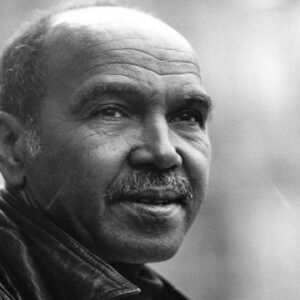Nuruddin Farah is a well-known Somali author and academic who is well-known for his feminist and nationalist writings. He was born in Somalia and attended both a Koran school and a British colonial institution. He grew up in a multilingual setting, learning Somali, English, Italian, and Arabic as a result of his family’s escape to Ogaden. He decided to become a writer while pursuing his education in India, and subsequently published his first novel. His writing career came to an abrupt halt in the mid-1970s, when his frank representation of Somali society in his novels during the dictator Maxamed Siyaad Barre’s leadership got him in difficulties and pushed him into exile. He spent most of his exile wandering throughout the world, teaching in Germany, Italy, India, and the United States. He didn’t return to his homeland for another 22 years, during which time he wrote some of his most famous trilogies, including ‘Variations on the Theme of an African Dictatorship’ and ‘Blood in the Sun.’ He utilized his writings to express his resistance to Somali cultural standards as well as to study postcolonial dictatorships, violence, and Africa’s crumbling state. Women’s rights, the relationship between developed and developing countries, and Somalia’s pre-Islamic view of religion are among his most recurring subjects in his literature. He became one of Somalia’s most recognized writers thanks to his vivid imagination and innovative use of his chosen language.
Childhood and Adolescence
Nuruddin Farah was born in Baidoa, Somalia, on November 24, 1945, to Hassan Farah, a colonial government translator, and his wife, Aleeli Faduma, a well-known Somalian writer.
Nuruddin migrated to the Ogaden region of Ethiopia when he was a child, where his father worked as a British interpreter. He received his early education in Somalia and Ethiopia’s neighboring Ethiopia, where he studied English, Arabic, and Amharic.
His family was forced to evacuate Ogaden in 1963, three years after Somalia gained independence, due to violent border clashes. The next year, he began working for Somalia’s Ministry of Education as a clerk-typist.
He enrolled in Panjab University in Chandigarh, India, in 1966 and graduated in 1970 with a bachelor’s degree in philosophy, literature, and sociology.
Career of Nuruddin Farah
He began writing in English after releasing a short story in his mother tongue. ‘From a Crooked Rib,’ a novella about a nomad girl fleeing an arranged marriage to a considerably older man, was published in 1970.
The Somali dictatorial regime was furious when he published his next novel, A Naked Needle (1976). It was a story about interracial and cross-cultural love set in post-revolutionary Somalia in the mid-1970s, and it painted a bleak image of life in the country.
During a trip to Europe, Nuruddin Farah learned that the Somali government was planning to detain him for the contents of his most recent book. As a result, he embarked on a twenty-two-year self-imposed exile.
He spent the following few decades traveling around Africa and Europe, but he refused to go to the United States, despite the fact that he was being courted by a number of universities. He lectured at universities in the United States, Germany, Italy, Sweden, and India as a guest professor.
With the novel ‘Sweet and Sour Milk,’ Nuruddin Farah began a trilogy dubbed ‘Variations on the Theme of an African Dictatorship’ in 1979. The sequel, ‘Sardines,’ was released in 1981, and the final installment, ‘Close Sesame,’ was released in 1983. (1983).
He moved to Berlin in 1990 after receiving a grant from the German Academic Exchange Service. After 22 years in exile, he returned to Somalia in 1996 for the first time.
In 1986, he published ‘Maps,’ the first book in his second trilogy, ‘Blood in the Sun.’ ‘Gifts’ (1992) and ‘Secrets’ (1998) are the second and third installments of the trilogy, respectively.
With the novel ‘Links,’ he began a new trilogy in 2004. The trilogy’s second installment, ‘Knots,’ was released in 2007, and the last installment, ‘Crossbones,’ was released in 2011.
He is regarded as a significant scholar in Somali Studies, in addition to being a novelist. He is also a member of Bildhaan: An International Journal of Somali Studies’ International Advisory Board.
Major Projects of Nuruddin Farah
Nuruddin Farah’s debut novel, ‘From a Crooked Rib,’ was published in 1970 and is regarded one of his most renowned works. It depicted a woman’s struggle to protect her dignity in society and branded him as a “masculine feminist.”
His novel ‘Maps,’ the first installment of his ‘Blood in the Sun’ trilogy, was published in 1986 and gained him a lot of attention as an author. The novel is set during the 1977 Ogaden conflict, and it employs second-person narration to explore cultural identity in a post-independence environment.
Achievements & Awards
He received the ‘English-Speaking Union Award’ in 1980.
In Sweden, he received the ‘Kurt Tucholsky Prize,’ while in Berlin, he received the ‘Lettre Ulysses Award.’
Nuruddin Farah was awarded the Neustadt International Prize for Literature by the University of Oklahoma and its publication, World Literature Today, in 1998, a highly renowned literary prize.
He has been nominated for the Nobel Prize in Literature several times but has yet to win it.
Personal History and Legacy
He married Chitra Muliyil, an Indian woman, in 1970. The couple had a child named Koschin, however the marriage was short-lived, and they divorced in 1972.
Nuruddin Farah married Nigerian-British writer Amina Mama in 1992. Abyan and Kaahiye, the couple’s two children, were born to them.
Estimated Net Worth
Nuruddin is one of the wealthiest novelists and one of the most well-known novelists. Nuruddin Farah’s net worth is estimated to be $1.5 million, according to Wikipedia, Forbes, and Business Insider.


